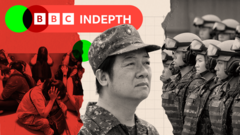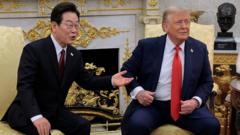Is Taiwan Ready for a Chinese Attack with Drills and Mock Missile Strikes?

Published: 2025-08-25 23:35:10 | Category: technology
Recent military drills in Taiwan, including realistic simulations of urban warfare and mass civil defence exercises, reflect the island's growing concerns over a potential threat from China. The Taiwanese government, led by President William Lai, is intensifying its defence strategies amidst rising tensions, advocating for increased military spending and citizen preparedness. This heightened sense of urgency raises questions about Taiwan's future, public sentiment towards China, and the implications of an increasingly militarised response.
Last updated: 24 October 2023 (BST)
Key Takeaways
- Mandatory military drills are being conducted across Taiwan to prepare for potential Chinese aggression.
- Public opinion remains divided, with many residents feeling sceptical about the likelihood of an invasion.
- The Taiwanese government is increasing defence spending and reforming military training to enhance readiness.
- China's growing military presence and rhetoric are raising alarms in Taiwan, prompting discussions on national security.
- The potential for economic ties and cultural connections complicates the narrative of conflict versus cooperation with China.
The Context of Civil Defence Drills
In September 2023, Taiwan conducted extensive civil defence and military drills in response to escalating tensions with China. The air raid sirens blaring across the island served as a stark reminder of the geopolitical realities facing Taiwan. These exercises, intended to rehearse responses to a potential attack, included both government officials and volunteer actors simulating casualties. The drills highlighted Taiwan's serious commitment to preparedness, especially as China continues to assert its claim over the self-governing territory.
President William Lai's Defence Strategy
President Lai, who took office in 2022, has embarked on one of the most robust defence initiatives in recent Taiwanese history. His administration is not only enhancing military capabilities but also aiming to shift the mindset of the Taiwanese populace regarding the threat posed by China. Lai's mantra, "By preparing for war, we are avoiding war," underscores his approach to defence — one that seeks to deter aggression without provoking conflict.
Increasing Defence Spending
In line with US expectations for greater investment in regional security, Taiwan's government plans to increase defence spending by 23% in the upcoming year, amounting to approximately NT$949.5 billion (£23 billion; $31 billion). This increase would represent over 3% of Taiwan's GDP, with a target of reaching 5% by 2030. The funding is intended to enhance military capabilities, improve personnel training, and address issues such as troop shortages and morale.
Civil Defence in a Changing Landscape
The annual Han Kuang military exercises have undergone significant changes, transitioning from scripted scenarios to realistic simulations of urban warfare. In 2023, the exercises featured 22,000 reservist troops, marking a 50% increase from the previous year. This evolution aims to prepare Taiwanese forces for various combat situations, including potential urban conflicts that could arise in densely populated areas.
Public Sentiment Towards Defence Drills
While many support the government's defence initiatives, public sentiment remains mixed. A survey conducted by the Institute for National Defense and Strategic Research (INDSR) revealed that 65% of respondents believe an immediate invasion by China is unlikely. This hesitance is evident in areas like Kinmen, where the local economy thrives on cross-strait tourism and many residents view their proximity to China as an advantage rather than a threat.
The Impact of Historical Context
Kinmen's historical experiences with Chinese aggression, including the Second Taiwan Strait Crisis in 1958, shape current attitudes. Many older residents, like 77-year-old Yang Peiling, recall traumatic events but now perceive a more peaceful relationship with Chinese tourists. This perspective contrasts sharply with the government's portrayal of China as a looming threat, illustrating a significant divide in public perception.
Perceptions of the Chinese Threat
Despite the government's heightened rhetoric about China's intentions, some Taiwanese citizens remain sceptical about the likelihood of an invasion. Many believe that China's economic interests would prevent it from taking aggressive military action. This perspective is reinforced by the view that any military conflict would be costly and counterproductive for Beijing.
The Role of the United States
The United States has historically played a crucial role in Taiwan's defence strategy, with legal obligations to support its security. However, there are growing concerns about the reliability of this support, particularly as international dynamics shift. Analysts suggest that while the US military capability currently surpasses China's, the balance of power may evolve, raising questions about Taiwan's future security.
Understanding Military Preparedness
As tensions rise, Taiwan's government emphasises the need for citizens to acknowledge the potential for conflict. Some officials argue that failing to recognise China's military ambitions could leave Taiwan vulnerable. The perception of an impending threat has led to increased scrutiny of pro-China sentiments within Taiwan, with measures introduced to counteract perceived influence from Beijing.
The Challenge of Public Support
While there is a degree of public support for increased defence spending and military reforms, concerns persist about the potential for provoking China. Critics of the Democratic Progressive Party (DPP) argue that the government is using fears of invasion to gain political capital, potentially destabilising cross-strait relations. This tension complicates the narrative of defence versus diplomacy in Taiwan's approach to China.
Future Considerations for Taiwan
The ongoing debate about Taiwan's security continues to evolve, with many citizens caught between the desire for peace and the need for preparedness. The prospect of a Chinese invasion remains an existential question, but the complexities of public sentiment, international relations, and historical context underscore the challenges Taiwan faces in navigating its future.
FAQs
What are the recent military drills in Taiwan about?
The recent military drills in Taiwan are aimed at preparing for a potential Chinese attack, focusing on urban warfare and civil defence. They include realistic simulations and participation from both military personnel and civilians.
How is public opinion on the threat from China evolving in Taiwan?
Public opinion is divided; while many believe in the necessity of defence preparations, a significant portion of the population remains sceptical about the immediate threat of an invasion.
What measures is Taiwan taking to strengthen its military?
Taiwan is increasing its defence budget, reforming military training, and conducting large-scale exercises to improve readiness and address issues like troop shortages and morale.
What role does the US play in Taiwan's defence strategy?
The US has a legal obligation to support Taiwan's security, but concerns about the reliability of this support are growing, especially given changing international dynamics.
How does historical context influence current attitudes towards China in Taiwan?
Historical experiences, such as past conflicts with China, shape public perceptions. Many residents of areas like Kinmen see their relationship with China as economically beneficial rather than threatening.
As Taiwan navigates its complex relationship with China, the balance between defence readiness and public sentiment will play a crucial role in shaping the island's future. What will the next chapter in this ongoing narrative entail? #Taiwan #ChinaRelations #MilitaryDrills



